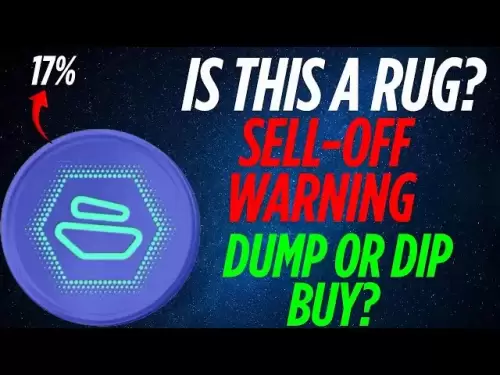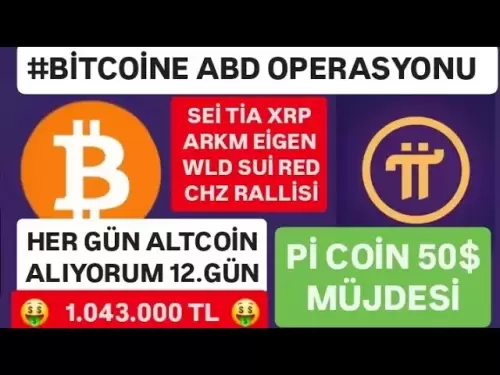-
 Bitcoin
Bitcoin $107,810.8710
-1.45% -
 Ethereum
Ethereum $2,531.4386
-1.75% -
 Tether USDt
Tether USDt $1.0000
-0.03% -
 XRP
XRP $2.2542
-0.99% -
 BNB
BNB $659.1350
-0.50% -
 Solana
Solana $148.5456
-2.40% -
 USDC
USDC $0.9999
-0.02% -
 TRON
TRON $0.2868
-0.44% -
 Dogecoin
Dogecoin $0.1666
-3.65% -
 Cardano
Cardano $0.5751
-2.36% -
 Hyperliquid
Hyperliquid $37.6845
-5.51% -
 Bitcoin Cash
Bitcoin Cash $494.9448
-0.65% -
 Sui
Sui $2.8396
-3.31% -
 Chainlink
Chainlink $13.2423
-2.59% -
 UNUS SED LEO
UNUS SED LEO $9.0482
0.02% -
 Stellar
Stellar $0.2467
-2.44% -
 Avalanche
Avalanche $17.8165
-3.63% -
 Shiba Inu
Shiba Inu $0.0...01158
-2.41% -
 Toncoin
Toncoin $2.7397
-3.42% -
 Hedera
Hedera $0.1560
-2.73% -
 Litecoin
Litecoin $85.8559
-2.34% -
 Monero
Monero $315.3710
-2.30% -
 Dai
Dai $1.0001
0.00% -
 Polkadot
Polkadot $3.3443
-2.03% -
 Ethena USDe
Ethena USDe $1.0001
0.01% -
 Bitget Token
Bitget Token $4.2888
-3.73% -
 Uniswap
Uniswap $7.3388
-1.57% -
 Aave
Aave $278.2986
-3.05% -
 Pepe
Pepe $0.0...09807
-3.67% -
 Pi
Pi $0.4563
-2.39%
Dogecoin hidden bullish divergence explained
Dogecoin shows hidden bullish divergence when its price makes a higher low but the RSI or MACD forms a lower low, signaling potential upward momentum in an uptrend.
Jul 08, 2025 at 03:57 am
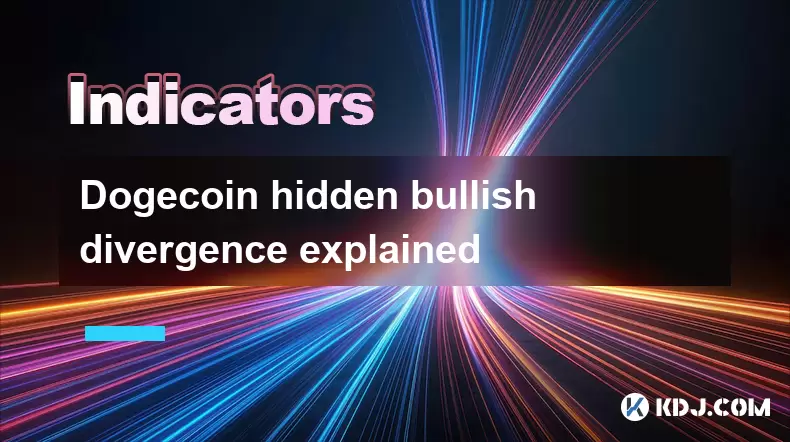
Understanding Bullish Divergence in Cryptocurrency Trading
In cryptocurrency trading, bullish divergence is a technical analysis concept that signals a potential reversal from a downtrend to an uptrend. This occurs when the price of an asset makes a lower low, but a momentum oscillator (like RSI or MACD) forms a higher low. In the case of Dogecoin, this pattern can indicate underlying strength despite short-term bearish movement.
The key to identifying bullish divergence lies in observing discrepancies between price action and oscillator readings. For example, if Dogecoin's price drops below a previous swing low, yet the RSI does not confirm that move by making a new low, it suggests weakening selling pressure and possible accumulation.
Traders often use this as a signal to prepare for long entries or to close short positions. It's crucial to validate the divergence using candlestick patterns or volume spikes before acting on it.
Dogecoin’s Price Behavior During Hidden Bullish Divergence
A hidden bullish divergence is slightly different from regular bullish divergence. It typically appears during corrective phases within an overall uptrend. In this scenario, Dogecoin’s price makes a higher low while the oscillator makes a lower low. This indicates that buyers are still in control and may soon resume pushing prices upward.
This type of divergence is considered "hidden" because it doesn’t always catch the eye of novice traders. However, experienced ones look for it during retracements to find optimal entry points. If Dogecoin is in a strong uptrend and pulls back with hidden bullish divergence, it could be a sign to re-enter long positions.
For instance, suppose Dogecoin retraces to a key support level such as a 20-day moving average. If at the same time, the RSI forms a lower low while the price makes a higher low, this confirms hidden bullish divergence. Traders should watch for candlestick reversals like hammer or engulfing patterns to confirm the signal.
Using Technical Indicators to Confirm Hidden Bullish Divergence in Dogecoin
To effectively identify hidden bullish divergence in Dogecoin, traders must rely on specific technical indicators:
- Relative Strength Index (RSI): One of the most commonly used oscillators for divergence detection. A rising RSI during a pullback in price suggests growing buying momentum.
- Moving Average Convergence Divergence (MACD): When the MACD line starts to rise even though Dogecoin’s price continues to fall, it hints at underlying strength.
- Volume: Increasing volume during a price decline can also serve as confirmation that institutional or retail buyers are stepping in.
It's important to overlay these tools on Dogecoin’s chart and compare recent swings. Use horizontal lines to mark swing highs and lows on the price chart and draw trendlines on the oscillator window. If those trendlines diverge — especially in a way that shows higher lows on price and lower lows on the oscillator — then you've likely found a hidden bullish divergence setup.
Avoid relying on one indicator alone. Always cross-check with at least two oscillators and volume data to reduce false positives.
How to Trade Dogecoin Based on Hidden Bullish Divergence
Once hidden bullish divergence has been confirmed, the next step is to plan your trade entry, stop loss, and target levels.
- Entry Point: Wait for a breakout above the most recent resistance level or for a bullish candlestick pattern such as a morning star or bullish engulfing.
- Stop Loss: Place your stop just below the most recent swing low where the divergence was formed. This protects against unexpected breakdowns.
- Take Profit: Use Fibonacci extensions or prior resistance-turned-support zones to set realistic profit targets. Alternatively, trail your stop behind each new swing high to maximize gains.
Use small position sizes initially, especially if the market seems volatile. You can scale into the trade if the pattern plays out as expected. Consider setting alerts on platforms like TradingView so you don’t miss the exact moment the divergence aligns with a breakout.
Additionally, check for news events or macroeconomic factors that could impact Dogecoin’s price independently of technical setups. Even the strongest technical pattern can be invalidated by sudden regulatory changes or major exchange announcements.
Common Mistakes to Avoid When Identifying Hidden Bullish Divergence in Dogecoin
Many traders misinterpret divergence due to common pitfalls:
- Ignoring Timeframes: Divergence seen on a 1-hour chart might not hold on the daily chart. Always analyze multiple timeframes — especially the daily and 4-hour charts — to ensure consistency.
- Overtrading Weak Signals: Just because there's a divergence doesn't mean the price will reverse immediately. Wait for confirmation through candlesticks or volume surges before entering.
- Neglecting Market Context: Hidden bullish divergence works best in trending markets. Using it in a sideways or choppy environment can lead to losses.
- Failing to Adjust Stop Losses: Markets can fake traders out with sharp moves before resuming their original direction. Ensure your stop loss isn't too tight to get stopped out prematurely.
Also, avoid emotional trading. Stick to your strategy and risk management rules. Divergence is a tool, not a guaranteed outcome.
Frequently Asked Questions
Q: Is hidden bullish divergence reliable for predicting Dogecoin’s price movements?
While hidden bullish divergence is a strong indicator, it shouldn’t be used in isolation. Combining it with other tools like moving averages, volume analysis, and support/resistance levels significantly improves accuracy.
Q: Can I use hidden bullish divergence on altcoins other than Dogecoin?
Yes, hidden bullish divergence applies to any cryptocurrency or financial instrument that shows trending behavior. However, it tends to work better on assets with sufficient liquidity and clear trends, such as Ethereum or Litecoin.
Q: How do I differentiate between regular and hidden bullish divergence?
Regular bullish divergence occurs during downtrends and shows a lower price low with a higher oscillator low. Hidden bullish divergence occurs during uptrends and features a higher price low with a lower oscillator low. The context of the overall trend helps distinguish them.
Q: Do professional traders use hidden bullish divergence in their strategies?
Yes, many institutional and professional traders incorporate hidden bullish divergence into multi-indicator systems. It’s especially useful in conjunction with order flow and smart money concepts.
Disclaimer:info@kdj.com
The information provided is not trading advice. kdj.com does not assume any responsibility for any investments made based on the information provided in this article. Cryptocurrencies are highly volatile and it is highly recommended that you invest with caution after thorough research!
If you believe that the content used on this website infringes your copyright, please contact us immediately (info@kdj.com) and we will delete it promptly.
- BlockDAG Leads the Web3 Race with Sports Partnerships and Strategic Pricing
- 2025-07-08 10:50:12
- Pepe, Dogecoin, Shiba Inu: Meme Coin Mania or Calculated Crypto?
- 2025-07-08 10:30:12
- Bitcoin, Ethereum, and Tariff Tussles: Decoding the Crypto Market's Latest Moves
- 2025-07-08 10:30:12
- BOOM Airdrop 2025: Claim Tokens and Join the Web3 Revolution
- 2025-07-08 10:35:12
- Ethereum, Exchanges, and Price Resilience: Navigating the Crypto Landscape
- 2025-07-08 08:30:13
- Bitcoin's NVT Golden Cross: Is a Local Top Brewing?
- 2025-07-08 09:10:11
Related knowledge
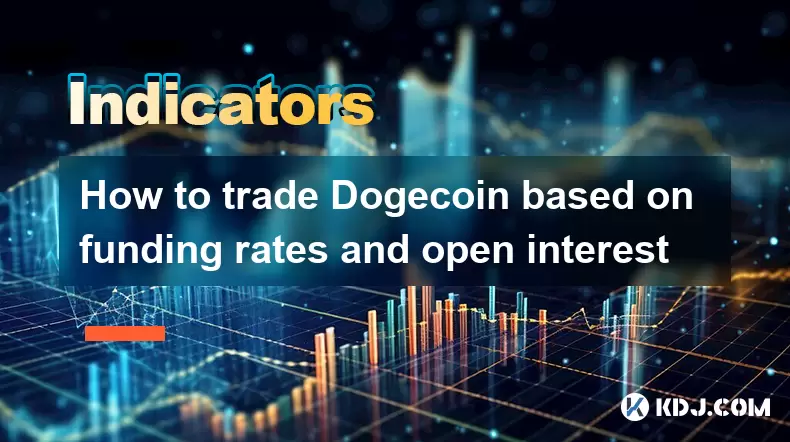
How to trade Dogecoin based on funding rates and open interest
Jul 07,2025 at 02:49am
Understanding Funding Rates in Dogecoin TradingFunding rates are periodic payments made to either long or short traders depending on the prevailing market conditions. In perpetual futures contracts, these rates help align the price of the contract with the spot price of Dogecoin (DOGE). When funding rates are positive, it indicates that long positions p...
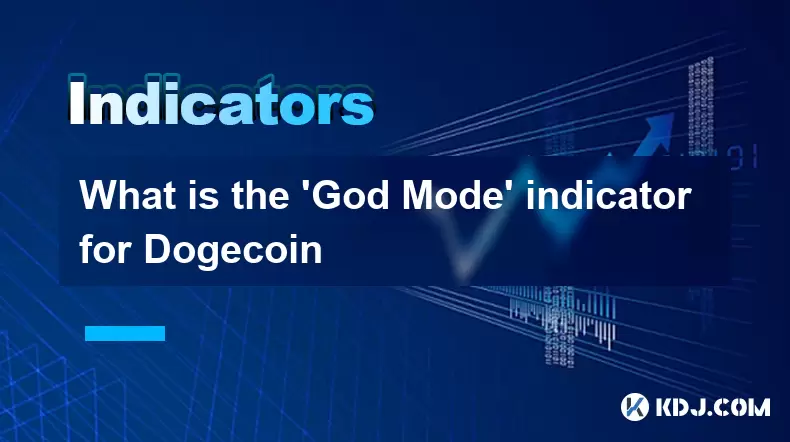
What is the 'God Mode' indicator for Bitcoincoin
Jul 07,2025 at 04:42pm
Understanding the 'God Mode' IndicatorThe 'God Mode' indicator is a term that has emerged within cryptocurrency trading communities, particularly those focused on meme coins like Dogecoin (DOGE). While not an officially recognized technical analysis tool or formula, it refers to a set of conditions or patterns in price action and volume that some trader...
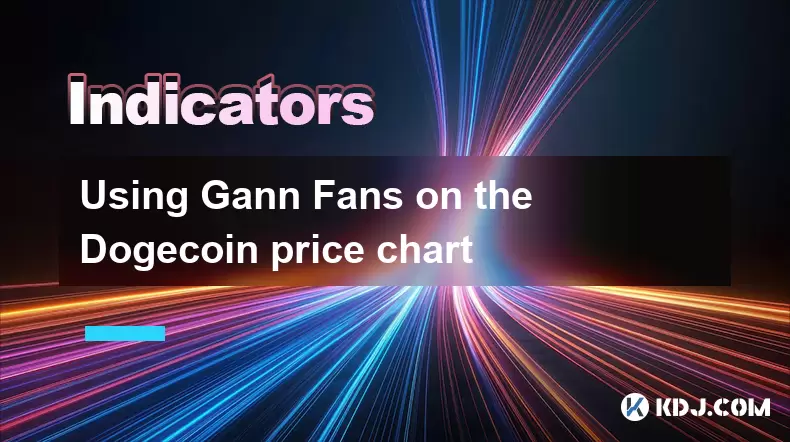
Using Gann Fans on the Dogecoin price chart
Jul 07,2025 at 09:43pm
Understanding Gann Fans and Their Relevance in Cryptocurrency TradingGann Fans are a technical analysis tool developed by W.D. Gann, a renowned trader from the early 20th century. These fans consist of diagonal lines that radiate out from a central pivot point on a price chart, typically drawn at specific angles such as 1x1 (45 degrees), 2x1, 1x2, and o...
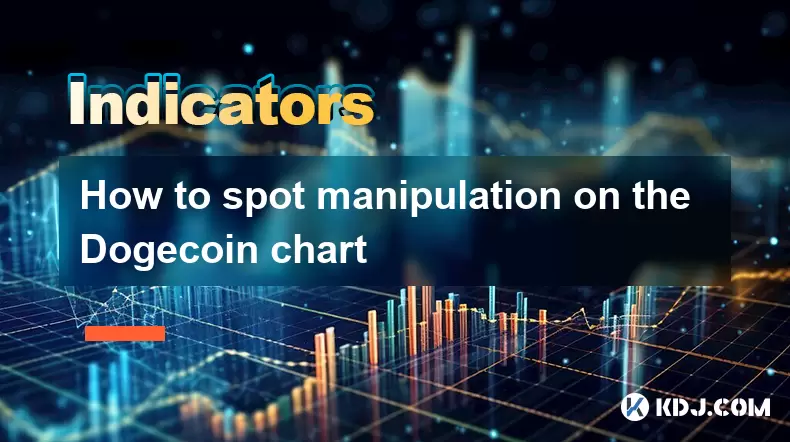
How to spot manipulation on the Dogecoin chart
Jul 06,2025 at 12:35pm
Understanding the Basics of Chart ManipulationChart manipulation in the cryptocurrency space, particularly with Dogecoin, refers to artificial price movements caused by coordinated trading activities rather than genuine market demand. These manipulations are often executed by large holders (commonly known as whales) or organized groups aiming to mislead...
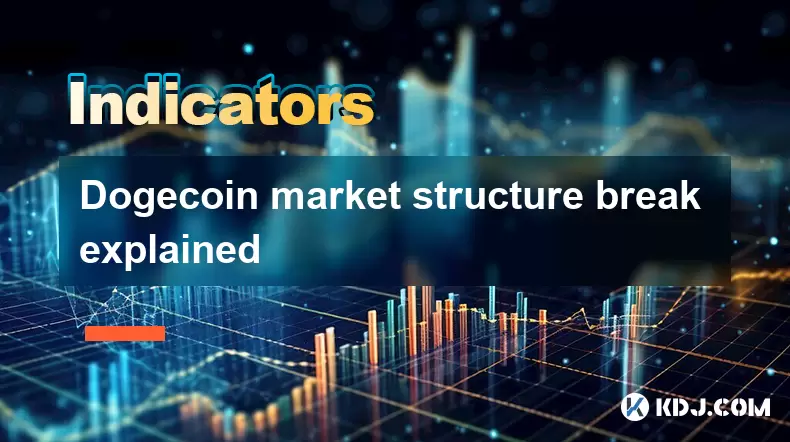
Bitcoincoin market structure break explained
Jul 07,2025 at 02:51am
Understanding the Dogecoin Market StructureDogecoin, initially created as a meme-based cryptocurrency, has evolved into a significant player in the crypto market. Its market structure refers to how price action is organized over time, including support and resistance levels, trend lines, and patterns that help traders anticipate future movements. A mark...
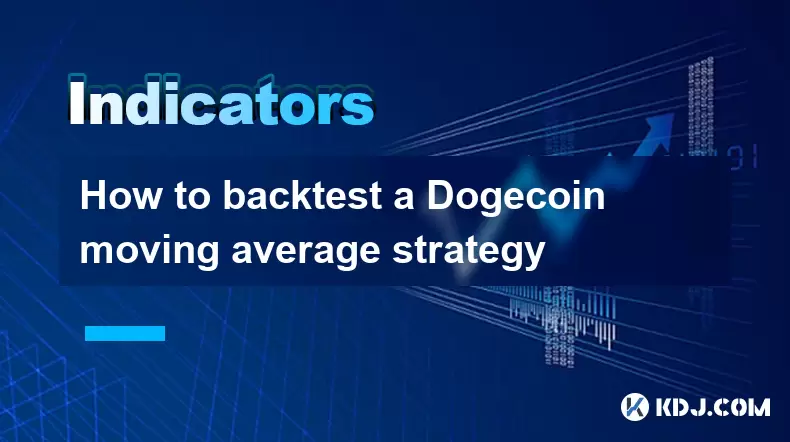
How to backtest a Dogecoin moving average strategy
Jul 08,2025 at 04:50am
What is a Moving Average Strategy in Cryptocurrency Trading?A moving average strategy is one of the most commonly used technical analysis tools in cryptocurrency trading. It involves analyzing the average price of an asset, such as Dogecoin (DOGE), over a specified time period to identify trends and potential entry or exit points. Traders often use diff...

How to trade Dogecoin based on funding rates and open interest
Jul 07,2025 at 02:49am
Understanding Funding Rates in Dogecoin TradingFunding rates are periodic payments made to either long or short traders depending on the prevailing market conditions. In perpetual futures contracts, these rates help align the price of the contract with the spot price of Dogecoin (DOGE). When funding rates are positive, it indicates that long positions p...

What is the 'God Mode' indicator for Bitcoincoin
Jul 07,2025 at 04:42pm
Understanding the 'God Mode' IndicatorThe 'God Mode' indicator is a term that has emerged within cryptocurrency trading communities, particularly those focused on meme coins like Dogecoin (DOGE). While not an officially recognized technical analysis tool or formula, it refers to a set of conditions or patterns in price action and volume that some trader...

Using Gann Fans on the Dogecoin price chart
Jul 07,2025 at 09:43pm
Understanding Gann Fans and Their Relevance in Cryptocurrency TradingGann Fans are a technical analysis tool developed by W.D. Gann, a renowned trader from the early 20th century. These fans consist of diagonal lines that radiate out from a central pivot point on a price chart, typically drawn at specific angles such as 1x1 (45 degrees), 2x1, 1x2, and o...

How to spot manipulation on the Dogecoin chart
Jul 06,2025 at 12:35pm
Understanding the Basics of Chart ManipulationChart manipulation in the cryptocurrency space, particularly with Dogecoin, refers to artificial price movements caused by coordinated trading activities rather than genuine market demand. These manipulations are often executed by large holders (commonly known as whales) or organized groups aiming to mislead...

Bitcoincoin market structure break explained
Jul 07,2025 at 02:51am
Understanding the Dogecoin Market StructureDogecoin, initially created as a meme-based cryptocurrency, has evolved into a significant player in the crypto market. Its market structure refers to how price action is organized over time, including support and resistance levels, trend lines, and patterns that help traders anticipate future movements. A mark...

How to backtest a Dogecoin moving average strategy
Jul 08,2025 at 04:50am
What is a Moving Average Strategy in Cryptocurrency Trading?A moving average strategy is one of the most commonly used technical analysis tools in cryptocurrency trading. It involves analyzing the average price of an asset, such as Dogecoin (DOGE), over a specified time period to identify trends and potential entry or exit points. Traders often use diff...
See all articles

























